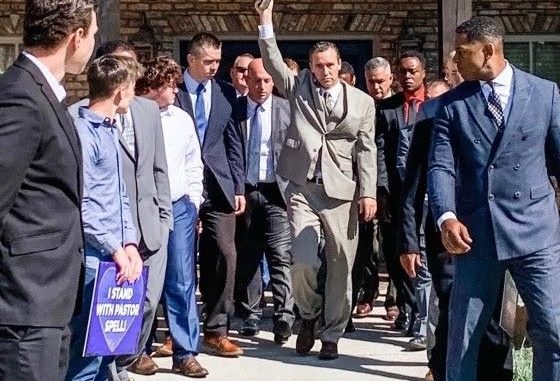
They are the pastor and the protester — both native sons of Louisiana, both products of religious households, both self-proclaimed fighters for their constitutional rights.
And for weeks, they have faced off at a Pentecostal church that has defied coronavirus restrictions even as members became infected and one died.
One of the men was arrested and jailed. The other walked away. Both claimed victory.
The dispute about constitutional rights and restrictions to protect public health is likely to play out across the country as more states ease lockdowns this month. With the pastor and the protester, the conflict progressed publicly in this suburb just outside the state capital, winning both men passionate defenders and detractors.
Some passersby have told the protester, Trey Bennett, that he’s doing the Lord’s work. But he has also been cursed by people like the man who slowed down his truck next to Bennett on Sunday and rolled down the window.
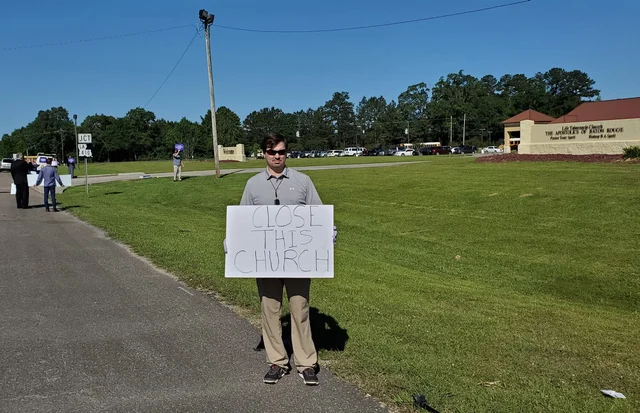
“Bless this church and people of faith,” the man said, smiling. “May you burn in hell.”
Life Tabernacle Church was founded 60 years ago by the grandparents of Rev. Tony Spell, who has held more than a dozen services at the church, some drawing 1,800 worshippers, since Gov. John Bel Edwards issued an order in March banning large crowds due to the virus.
This month, police charged Spell, 42, with a misdemeanor for violating the governor’s order. They said they would issue summonses for subsequent services, each carrying a potential $500 fine and 90-day jail sentence.
Spell refused to stop preaching.
Spell’s head usher, Harold Orillion, 78, an otherwise healthy Army veteran who had attended recent services, died April 15 of what the local coroner described as COVID-19. Church lawyer Jeff Wittenbrink, 59, who also attended services, was hospitalized with COVID-19 but was recovering at home Sunday.
Spell said he had spoken with Orillion’s family and that they did not believe he died of COVID-19 and had not wanted his cause of death made public.
To close the sprawling, seven-sanctuary church, Spell said, “would be an insult to the man who has passed; it would be an insult to all the heroes of the faith.”
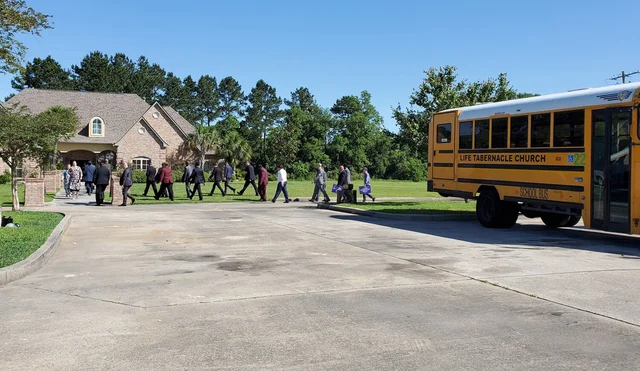
Spell has repeatedly said he is taking a stand for religious freedom. He considers it his mission to bring low-income residents from four neighboring parishes for fellowship and a hot meal, ferrying them in with a fleet of more than two dozen buses.
Just before Easter, Vice President Mike Pence pleaded for churches not to hold services with more than 10 people. Spell announced he would still preach and asked members to donate their federal stimulus checks to the ministry.
For Bennett, that was a deciding moment.
“It was time to do something,” he said.
Like Spell, the 39-year-old Bennett grew up in a religious family (Baptist and Catholic) with its own business (antiques). He loved his “church-heavy” Baton Rouge suburb and graduated from nearby Louisiana State University with a bachelor’s degree in history and religious studies.
Unlike Spell, Bennett dresses casually and, his degree notwithstanding, considers himself an “agnostic atheist anti-theist,” a “secular humanist” and a “slightly liberal independent,” although he acknowledged that’s a relative description.
“I am still from the South; I like shooting guns,” he said.
Bennett had never protested anything before. But he had time. He has been disabled since a bus ran into his car 17 years ago.
“People’s lives are more important than the right to assemble,” he said. “I don’t want to get coronavirus, and I don’t want it spread around my area. We already have higher rates of coronavirus in Baton Rouge.”
Bennett contacted police and the mayor’s office: Would he break any laws or interfere with public safety if he picketed on the road fronting the church?
He drove over for his first protest on Easter, his message written in black marker on white poster board: “Coronavirus incubator.”
In coming days, he added more signs, including, “Close this church” and “Danger: Death can occur.”
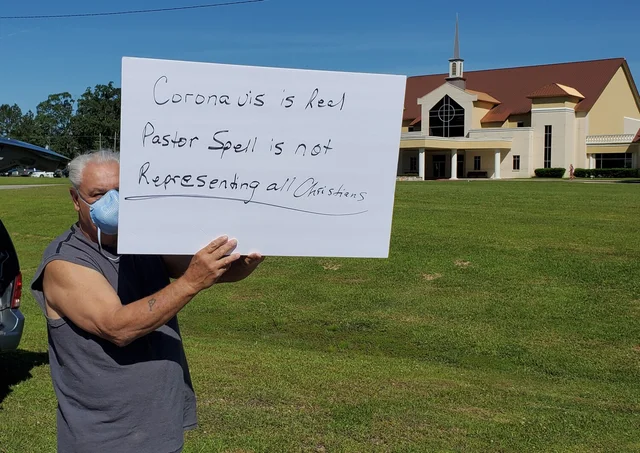
At first, Bennett couldn’t tell if he was making a difference. Supporters honked their approval. Church members told him they were praying for him.
Bennett never met the pastor during his protests. Spell accused him of accosting women on their way in with “vulgarities,” a charge Bennett denied.
“He constantly wants to make it about violations of his constitutional rights, when he’s the one violating my constitutional rights,” Bennett said.
Everything changed April 19.
Bennett was protesting as usual when he noticed one of the white church buses backing across the lawn toward him. Spell was behind the wheel.
“I assumed he was just turning his bus around until he kept backing up,” Bennett said. “Suddenly, there’s a bus in my face.”
The bus stopped a few feet away from Bennett, who uses a cane. The incident was captured on video by a neighbor’s security camera and turned over to police.
Bennett said he couldn’t see the bus’ rear-view mirrors, which suggests Spell didn’t see him, and it was fortunate the bus stopped in time.
Police charged the pastor with aggravated assault, which Bennett said was pivotal for his cause.
“He had given the person with the least power a great platform to stop him,” Bennett said. “I didn’t have any ability to physically stop him from going to his church. He handed me that ability, and the police took care of the rest.”
Spell was briefly jailed until his wife arrived with a cash collection the church had taken up to post his $5,000 bail. He announced he would hold services two days later, on Tuesday.
Bennett considered staying home, wary of spending time near church members who might be infected. He also worried about his safety. After the bus incident, he said, a truck had swerved at him as he maintained his post.
But, like Spell, Bennett refused to back down.
“I didn’t want to get intimidated out of what I was trying to do,” he said, especially as governors in Texas, Mississippi and other Southern states consider easing pandemic restrictions. “I’m really scared with this opening back up in the South. It’s definitely going to make things worse here.”
When he arrived at the church Tuesday, Bennett noticed something new: more fellow protesters, people of various religious backgrounds, including a former member of Life Tabernacle.
After the service, Spell was notified by the court that he had violated conditions of his bail by preaching to a large group. In response, Spell sent the judge a scripture verse, 1 Peter 3:14, “If ye suffer for righteousness’ sake, happy are ye and be not afraid of their terror, neither be troubled.”
On Saturday, authorities placed Spell under house arrest at his brick home next to the church. As a masked official fitted Spell with an electronic ankle monitor at his dining room table, supporters called out “Preach it, Tony,” prayed, cried, filmed and posted footage online.
“This is an unethical, illegal, unscrupulous, immoral attempt to silence the voice of this preacher,” the pastor said.
Spell said by phone afterward that he planned to risk arrest and return to church Sunday.
So did Bennett.
Sunday morning, Bennett arrived wearing a mask and gloves to find a dozen church supporters on the stretch of road he frequents, carrying signs that said, “I stand with Pastor Spell.” One called Bennett “the devil’s servant.”
Bennett shook his head.
“They can’t keep their counterprotest under 10 people,” he said, referring to the governor’s order on social distancing.
Soon, three of his supporters arrived with masks and signs of their own.
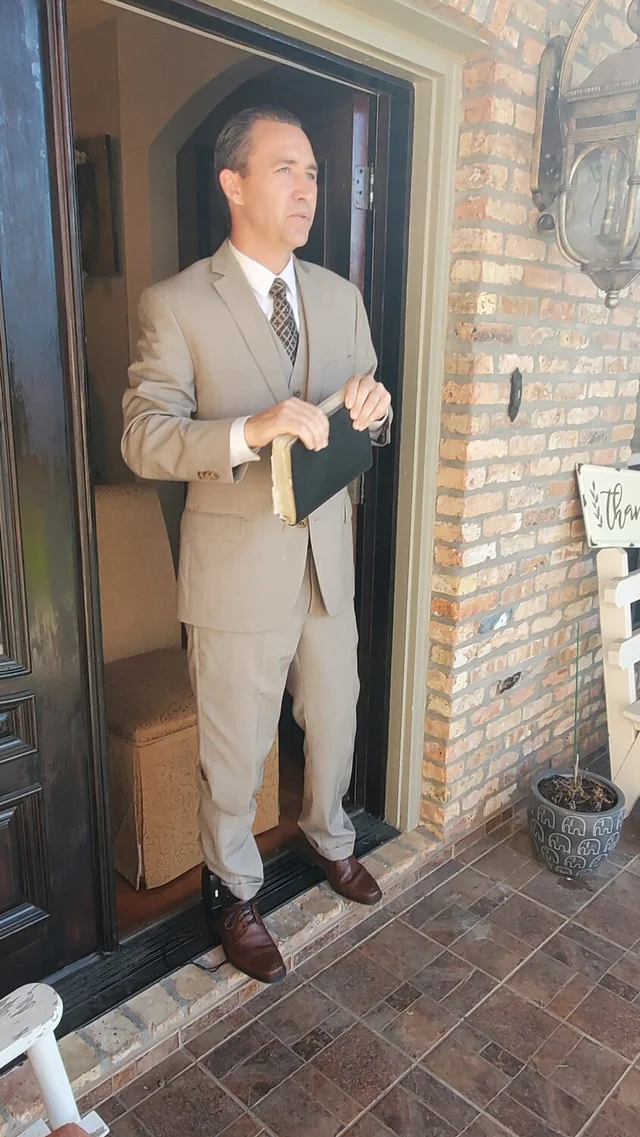
Just before the service started, Spell stood in his doorway, saying goodbye to church members in anticipation of being arrested. He said he couldn’t understand how police could go after him and not Bennett, whom he dismissed as a “sinister man.”
“America is calling wrong right and right wrong,” Spell said. “I’m going to make these cowardly judges prove I do not have the right to preach.”
Both Spell and Bennett watched as church buses pulled into the parking lot and felt vindicated: Spell because he still had supporters, Bennett because their ranks had dwindled. Some of the buses were empty, Bennett noted, as several hundred people filed into the sanctuary.
Spell, not wearing a mask, walked from his house to the church flanked by about a dozen churchgoers, most of them also without masks. He held his Bible high. He was not arrested, and there was no obvious police presence.
After the morning service, Spell remained inside the church and planned to preach again at the evening service, attorney Joe Long said. Bennett planned to be back too, ready with signs and a mask, for the next service.
*story by Los Angeles Times